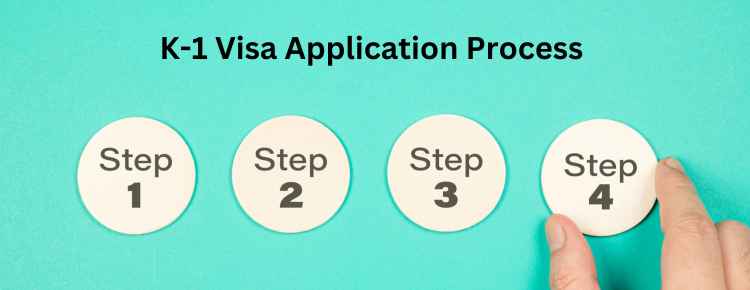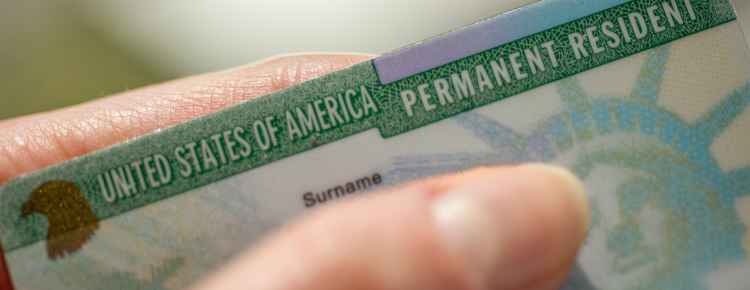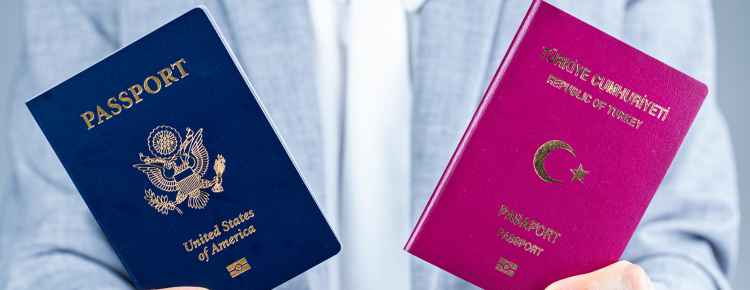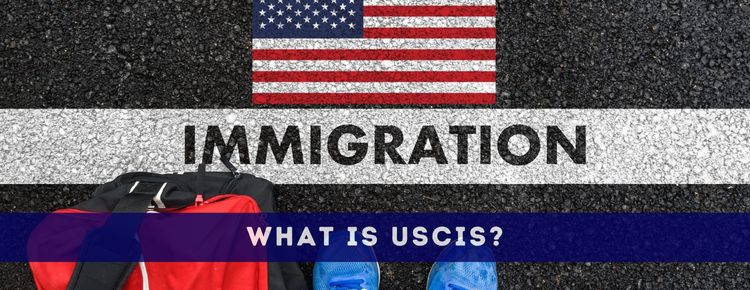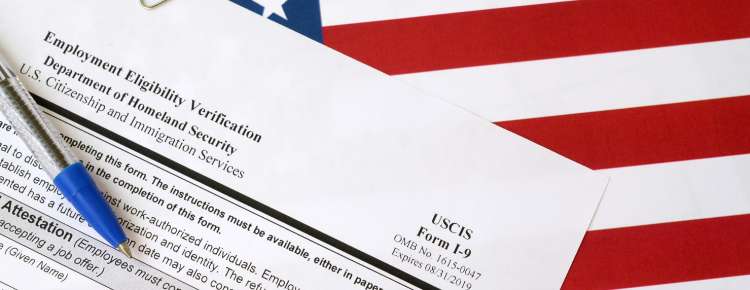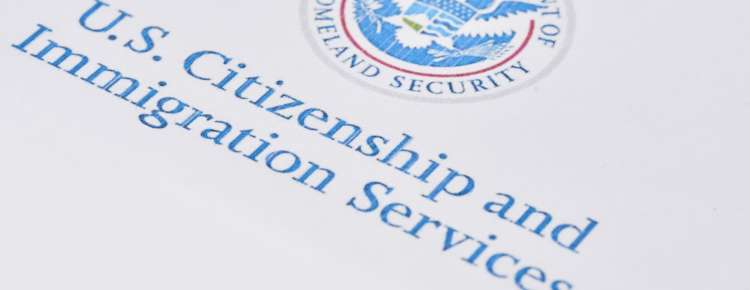Want to know, What is a national? Well, The Immigration and Nationality Act (INA) defines a national as a person owing permanent allegiance to a state. The term U.S. National includes all U.S. Citizens as well as persons who though not citizens of the United States, owe permanent allegiance to the United States (non-citizen nationals).
This can include people born in outlying possessions of the United States (American Samoa or Swains Island)
- Majority of people born in the U.S. and its territories are born as U.S. citizens
- Individuals born in American Samoa and Swains Islands are generally U.S. Nationals
- Historically, over the course of time with applicable law of that time, some persons born in U.S. possessions were born as U.S. nationals
- A U.S. national is a native of an American territorial possession.
Foreign nationals living in any state or qualified territory may naturalize
- After becoming permanent residents and
- Meeting a residence requirement, which is normally 5 years.
The terms US nationals and US citizens are often used interchangeably, leading to confusion regarding their meanings. The concepts of National and Citizen are often used interchangeably, but in the context of the United States, they hold distinct different meanings, and there are significant differences and legal implications.
In this article, we’ll unravel the mysteries surrounding the term national and explore the differences between a US national and a US citizen, shedding light on the significance of each.
Who Is Considered A U.S. National?
Individuals born in US territories like Puerto Rico and American Samoa are considered US nationals. Additionally, those born to US national parents in these territories or born abroad to US national parents may acquire US national status. The parents need to meet specific residency requirements.
- If a U.S. national wants to travel abroad, they can apply for a U.S. passport, they have the right to be protected by consular offices.
- They are given a U.S. passport with a special endorsement stating the holder is a U.S. national and not a U.S. citizen.
Nationals vs Citizen
US nationals are not the same as US citizens, but they share a connection to the United States. While both groups owe allegiance to the US, citizens enjoy broader rights and privileges due to their full American Citizenship. Nationals, on the other hand, hold nationality tied to specific territories.
- All U.S. citizens are U.S. nationals, but
- There are some U.S. nationals who are not U.S. citizens
A very small number fall into the category of non-citizen U.S. nationals (U.S. nationals) as defined in the Immigration and Nationality Act.
This highlights the distinction between U.S. citizenship and U.S. nationality.
- All U.S. citizens are U.S. nationals: This part emphasizes that every U.S. citizen holds U.S. nationality. In other words, U.S. citizenship includes U.S. nationality, and citizens enjoy the full set of rights and privileges that come with both statuses.
- Some U.S. nationals are not U.S. citizens: This part acknowledges that there are individuals who possess U.S. nationality but have not gone through the naturalization process to become full U.S. citizens.
- These individuals are referred to as U.S. nationals. They have certain rights and privileges, such as the ability to travel on a U.S. national passport and live in specific U.S. territories, but they do not hold the full right of U.S. citizenship, such as voting in federal elections.
In essence, U.S. nationality is a border category that encompasses both U.S. citizens and U.S. nationals, with U.S. citizens having the most comprehensive set of rights and privileges.

What Is A U.S. National?
A U.S. national is an individual who holds US national status, owing their allegiance to the United States. While this definition may seem similar to that of a US citizen, it is crucial to recognize that not all US nationals are US citizens. Nationality is often tied to specific US territories and possessions.
- A U.S. national is a person born in or having ties with an outlying possession of the U.S. (American Samoa and Swains Island).
- A US national is an individual who owes their allegiance to the United States but may not necessarily hold a US citizenship.
- This status is typically associated with individuals from certain US territories and possessions, such as Puerto Rico, American Samoa, Guam, the US Virgin Islands, and the United States who do not have the full rights and privileges of US citizens.
- It also includes individuals born abroad to two U.S national parents or
- Those born to one alien parent and one U.S. national parent. but there is a residency requirement for the parents of the child prior to birth in order to transmit U.S. nationality
- They enjoy certain rights, but they may not have the full privileges and responsibilities of a US citizen
- US nationality is typically obtained through provisions in the US Constitution, various laws, and international treaties.
- Nationals are entitled to all legal protection of U.S. citizens but do not have the complete political rights of U.S. citizens.
- Individuals born in any of the 50 US states, the District of Columbia, or almost any inhabited territories are US citizens by birthright, with the sole exception of American Samoa, where individuals are typically non-citizens US nationals at birth.
What U.S. National Can And Cannot Do?
US nationals are not allowed to vote in federal elections or serve in federal office. To do that, they will have to become naturalized citizens. However, US nationals are allowed to live and work in the US without restrictions, and they are given US passport with a special endorsement stating that the holder is a US national vs a US citizen.
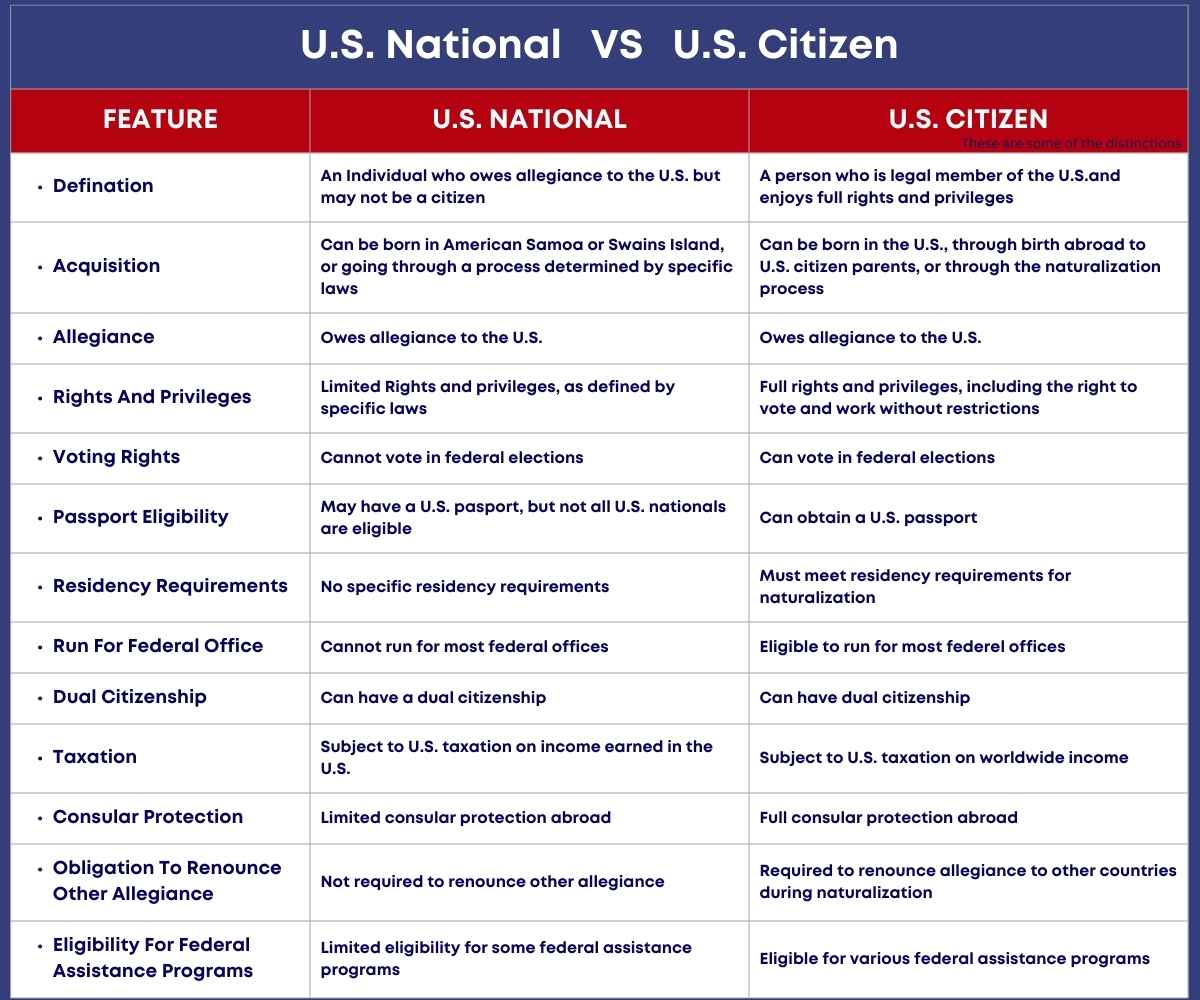
U.S. Nationality vs U.S. Citizenship
In consideration all U.S. citizens are U.S. nationals, but there are some US nationals who are not US citizens. The main difference between national and citizen is that
- Nationality relates to the place you are born
- Citizenship relates to the title given to you by the government
The primary difference between US nationals and US citizens revolves around their legal status and associated rights:
- Citizenship Rights: US citizens enjoy the full spectrum of rights, including the right to vote in federal elections, run for public office, and obtain a US passport.
- US nationals do not possess these privileges.
- National Origin: US nationals often hail from US territories or have acquired their status through descent or birth in these territories.
- US citizens, on the other hand, can be native-born or naturalized.
- Nationality vs Citizenship: US nationals have a nationality associated with their specific territory,
- US citizens have American citizenship.
- Travel Privileges: US citizens can travel internationally with a US passport,
- US nationals may use an alternative document, such as a US national passport
The major difference between between US citizens and US nationals is voting rights and eligibility to hold public office.
How To Prove U.S. Nationality
- Obtain a U.S national Passport
- Present a Consular Report of Birth Abroad (CRBA)
- Provide U.S Territory Birth Certificate
- Consular Assistance
- Legal Assistance
Rights And Restrictions Of A U.S. National
U.S. nationals are individuals who owe their allegiance to the United States but are not full U.S. citizens. As a result, they have a distinct set of rights, responsibilities, and restrictions compared to U.S. citizens. Here’s an overview of the rights and restrictions of a U.S national:
Rights Of A U.S National:
- Travel on a U.S. national Passport
- Live and Work in U.S. Territories
- Access to the U.S. Government Assistance
Restrictions And Limitations
- Limited Voting Rights
- Limited Citizenship Privileges
- Citizenship Application
- Limited Consular Protection
- Travel Documentations
- Dual Nationality Considerations
- Tax Obligations

Benefits For U.S. Nationals Who Naturalize
When U.S nationals choose to naturalize and become full U.S citizens, they gain a range of benefits and privileges that were not available to them as nationals. Naturalization is a significant step that grants U.S. nationals full citizenship, and it comes with various advantages. Here are some benefits for U.S nationals who choose to naturalize:
- Right to Vote
- Eligibility for Federal Public Office
- Access to U.S. Passport:
- Eligibility to certain Government Jobs
- Enhanced Government Benefits
- Freedom of travel
- Comprehensive Legal Rights
- Full Civic Participation
- Travel Convenience
- Consular Assistance
What Is A U.S. Citizen?
A person born in one of the fifty (50) United States, the district of Colombia, Puerto Rico, Guam, the U.S. Virgin Islands, or the Northern Mariana Islands, a person born outside of the U.S to at least one U.S parent, or naturalized citizen
People who either got citizenship by being naturalized or obtained birthright citizenship are known as U.S. citizens.
Birthright citizenship means that a person born in the United States becomes a citizen if they are born in the U.S.
They can also be citizens:
- If they are the child of U.S citizen parent(s)
- People born in specific U.S. territories obtain citizenship automatically
A U.S. citizen is an individual who holds full citizenship in the United States. U.S. citizenship is the highest legal status attainable in the United States and comes with a range of rights, privileges, and responsibilities.
Rights And Restrictions Of A U.S. Citizen
As U.S. citizens, individuals enjoy a range of rights and privileges but they are also subject to certain responsibilities. Here is an overview of the rights, responsibilities, and restrictions of a U.S. citizen.
Rights Of A U.S Citizen:
- Right to Vote: U.S. citizens have the fundamental right to vote in federal, state, and local elections. This right is the cornerstone of American democracy.
- U.S. Passport: Citizens can apply for and obtain a United States Passport, which allows them to travel internationally and receive consular protection while abroad.
- Right to Work: Citizens can work in any legal employment within the United States and are eligible for certain government jobs and benefits.
- Government Benefits: U.S. citizens are entitled to various government benefits, including social security, Medicare, Medicaid, and federal financial aid for education.
- Civic Participation: Citizens can run for public office, serve on juries, participate in civic activities, and engage in the political process.
- Freedom of speech and expression: Citizens have the right to freedom of speech, freedom of the press, and freedom of assembly, as protected by the First Amendment of the U.S Constitution.
- Right to Due Process: Citizens have the right to due process of law, ensuring fair treatment under the legal system and protection from arbitrary actions by the government.
- Religious Freedom: Citizens have the right to practice their chosen religion freely, as guaranteed by the First Amendment
Responsibilities Of A U.S. Citizen:
- Civic Duty
- Selective Service
- Jury Service
Restrictions And Limitations:
- Dual Citizenship
- Criminal Convictions
- Naturalized Citizens
- Taxes
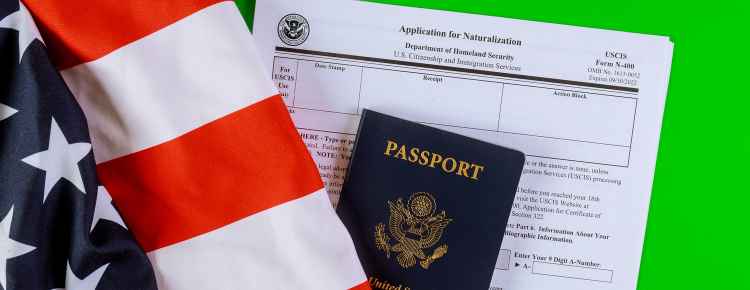
How U.S. Nationals Become American Citizens
Persons not born a citizen can through the process of naturalization acquire citizenship. Non-citizen nationals may file form N-400, Application for Naturalization, with USCIS (U.S. Citizenship and Immigration Services).
Usually a non-citizen national can apply for U.S. citizenship under the same rules as legal permanent residents. Even though non-citizen nationals are protected by swear allegiance to the U.S., they are not granted the same rights and benefits as full citizens. Since nationals are not citizens, they cannot vote in the election of federal politicians.
To become a U.S. citizen, non-citizen nationals must meet the following requirements:
- Must be at least 18 years old
- Be able to pass the English (able to read, write, and speak English) and civics tests (have knowledge and understanding of U.S. history and government)
- Have 5 years of continuous residence in the United States
- Must be physically present in the U.S. for at least 30 months out of the most recent 5 years
- Must be a person of good moral character
American National Meaning
The term American national is used to refer to individuals who hold US national status, indicating their allegiance to the United States. American nationals are typically associated with specific US territories, such as Puerto Rico, American Samoa, Guam, the US Virgin Islands, and the North Mariana Islands
The meaning of American national is closely linked to territorial nationality, as these individuals may not necessarily hold full US citizenship. While they share a connection with the United States, American nationals do not enjoy all the rights and privileges of US citizens, Such as the right to vote in federal elections or obtain a US passport. Instead, they may use an alternative travel document, like a national passport, for international travel.
The term American national emphasizes the distinction between US citizens and those who have a national status associated with specific territories. while they contribute to the diverse fabric of American identity, the legal implications and privileges of US nationals differ from those of US citizens
Certificates Of Non-Citizen Nationality
Certificates of Non-Citizen Nationality (often referred to as Nationality Certificates) are documents issued by the U.S. government to individuals who possess U.S. nationality but are not U.S. citizens. These certificates serve as official proof of an individual’s non-citizen U.S. nationality.
FAQ – U.S. National vs U.S. Citizen
What Does A U.S. National Mean?
The term U.S. National includes all U.S. Citizens as well as persons who though not citizens of the United States, owe permanent allegiance to the United States and are entitled to protection but does not have the full right of a U.S. Citizen
How Does A U.S. National Differ From A U.S. Citizen?
- A U.S. National do not have the right to vote in federal election or run for federal office
- U.S. citizens have the fundamental right to vote in federal, and state. and local elections.
- U.S. citizens have rights and responsibilities that U.S. National do not have
Can A U.S. National Become A U.S. Citizen?
Yes, U.S. National can become a U.S. citizen and apply for U.S. citizenship through the naturalization process
Do U.S. Nationals Need Visas To Live In The U.S.?
No, U.S. Nationals can live and work anywhere in the U.S. without any restrictions
Can U.S. Nationals Obtain U.S. Passport?
Yes, U.S. Nationals can obtain a U.S. Passport, but with status mentioned as a National and not a Citizen
How Does One Become A U.S. Citizen?
One can become a U.S. Citizen
- Either by birth within the U.S.
- Being born abroad to U.S. citizen parents
- Through the process of Naturalization (meeting certain requirements) and taking an oath of allegiance
Do U.S. Nationals Pay U.S. Taxes?
Yes, U.S. nationals pay U.S. taxes as they are subject to U.S. tax laws
Can U.S. Nationals Serve In The U.S. Military?
Yes, U.S. Nationals can serve in the U.S. Military





